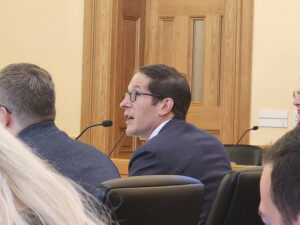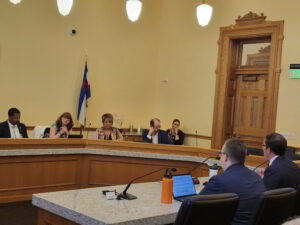Colorado’s budget now stands $955 million short of being able to cover expenses that legislators approved for this fiscal year — a hole created by a recent federal spending bill that is creating finger-pointing at the state Capitol and likely will lead to a special session.
State budget and departmental leaders laid out their first extensive estimates Tuesday of the budgetary impact of House Resolution 1, the “One Big Beautiful Bill” signed into law earlier this month by President Donald Trump. While legislators’ initially focused on Medicaid spending reductions — which that won’t hit the state budget until the 2026-27 fiscal year — officials now say the immediate concern is the drop in revenue the state will receive due to changes in federal tax policy.
Leaders from the governor’s Office of State Planning and Budgeting and the nonpartisan Legislative Council said they expect Colorado to generate $1.2 billion less than expected in tax revenue for the fiscal year that ends June 30 because of changes in federal policy. Those reductions will be offset somewhat by savings from tax credits that the budget hole will stop the state from offering and by a surplus from the past budget year can roll forward, but officials still must add or cut nearly $1 billion to balance the budget.
“This is different than ‘We’re just slowing the growth,’” OSPB Director Mark Ferrandino told the Executive Committee of the Legislative Council during a meeting Tuesday. “This is ‘We don’t have enough money to pay our bills.’”
How legislators could plug the budget hole
As such, Gov. Jared Polis, in conjunction with legislators, must take action — and needs to take it soon if the state plans to make spending cuts, Ferrandino argued to the committee of the six highest-ranking legislators. Because the budget is being spent even as state officials look for solutions, any delay could be costly. Were officials to want to eliminate, say, a $50 million program but waited until Jan. 1 to do so, the savings would be halved to $25 million because spending for the first half of the fiscal year already would be complete, and more cuts would be required.
One option would be to reduce the $2.33 billion reserve fund, which represents 15% of general-fund spending, by $955 million, taking it down to about 9% of general-fund expenditures. Ferrandino, however, recommended against using that much of the reserve, saying that replacing that money in the 2026-27 budget would compound a $679 million shortfall predicted for next year, and he also warned that the reserve is needed if a recession hits.
Polis has begun taking some steps, Ferrandino added, including pausing any controlled maintenance scheduled on state facilities and asking department heads for suggested cuts for both this year and next fiscal year. But larger programmatic cuts would require agreement from legislators, he said.

Mark Ferrandino, director of the Office of State Planning and Budgeting, speaks to the Executive Committee of the Legislative Council during a Tuesday hearing.
“We are looking at what executive action we could take,” he said. “The governor is also considering ‘Do we need to call a special session in late August to deal with this?’”
Executive Committee members did not elaborate on what cuts or revenue hikes they may consider if asked to come back into a special session. But a discussion of why the state finds itself in this budget hole was illustrative of the kind of steps they could take.
State budget is tied to federal budget
The spending shortfall comes from changes in tax policy in H.R. 1 that reduce federal tax revenue and, in turn, reduce state tax revenue because Colorado is one of a minority of states that conforms its tax law to federal law. Thus, any federal tax cut brings down revenue in the state by an equal amount unless the state proactively decouples its tax law from federal policy, as it has in some instances.
Legislative Council staffers said the biggest revenue hit — $770 million this year — will come from provisions that let businesses immediately deduct 100% of the costs of new equipment and that allow for more interest on loans and other expenses to be deducted. Another $243 million in lost revenue will come from changes to standard and itemized deductions, including on research-and-development expenses, property purchases and the payment of state and local taxes.
The state will lose another $40 million to $80 million annually because H.R. 1makes permanent the ability for owners of pass-through businesses like limited liability companies and sole proprietorships to deduct 20% of business income. And the state budget will lose $144 million this year because of provisions exempting overtime pay and tips from income taxes.
Legislators in May decoupled state policy on overtime pay from federal policy in a prospective effort to retain hundreds of millions of dollars in revenues — a move that has spawned both a proposed ballot initiative and a lawsuit to try to overturn it. However, the change did not take effect until July 1, while the federal law applies all its tax-provision changes beginning on Jan. 1 of this year, meaning the state will take a one-time hit for money that falls into that pot over the first six months of the year.
What decoupling from federal budget could do

Members of the Executive Committee of the Legislative Council hear a presentation on the state budget Tuesday.
Because the loss of revenues will bring total state revenues under its Taxpayer’s Bill of Rights cap for this fiscal year, the changes also will help the state paradoxically by eliminating some tax credits it otherwise would be required to offer. Those include about $305 million in earned-income tax credits for lower-wage Coloradans and in family-affordability tax credits for children of lower-income parents — both credits that legislative Democrats decried Tuesday that they won’t be able to offer.
Legislators could try to deal with the budget shortfall by decoupling even more of the state’s tax policies from federal policy — a move that would save them significant amounts of the $1.2 billion in projected lost revenue, though not all of it. However, the lawsuit over the overtime decoupling demonstrates that such a much could be questioned legally, and the idea of decoupling tax policy on tips could meet political resistance from restaurant and bar workers who could feel that would hurt them financially.
In many ways, these revenue cuts have become a separate issue from the more-publicized changes that the federal bill makes to Medicaid, the government-run public insurance program for low-income residents. By requiring states to recertify recipients’ eligibility twice a year, mandating able-bodied Medicaid recipients to work and limiting which immigrants can receive coverage, state officials expect some 152,000 Coloradans to lose Medicaid coverage in 2027.
Another 110,000 Coloradans are expected to drop private health-insurance coverage next year as elimination of enhanced premium tax credits sends premiums soaring, leaving already-struggling hospitals to care for more insured residents who can’t pay their bills. But while the state must begin preparing for those upheavals, they won’t have a direct impact on this year’s budget.
Legislators pointing fingers
As Polis appears to be readying to call a special session to bring legislators together to deal with the issue, leaders from the two parties began blaming each other for the budget situation, creating an auspicious beginning to what will be complex discussions.
Democrats blamed congressional Republicans for passing the federal bill and said that the party’s actions will hurt Colorado families.
“Coloradans are now the collateral damage of the GOP’s cruel bill, which could have been stopped by just a single Republican in Congress,” House Speaker Julie McCluskie, D-Dillon, said in a news release after the committee meeting. “The consequences for the state are devastating, and Republicans can’t hide the damage their party has caused.”
Republican leaders, meanwhile, fired back that the budget is in trouble because majority Democrats’ insistence on spending one-time federal pandemic funding to launch ongoing programs has created a structural deficit. Rep. Rick Taggart, a Republican member of the Joint Budget Committee, called on Polis to implement a hiring freeze and repeal unsustainable programs, and Senate Minority Leader Cleave Simpson said Republicans have been warning of this consequence.
“The Democrats’ last-minute scramble to address a problem of their own making is frustrating,” the Alamosa Republican said in a news release. “The crisis is entirely self-inflicted, not because of H.R. 1 but because of the Democrats’ mismatched priorities.”
